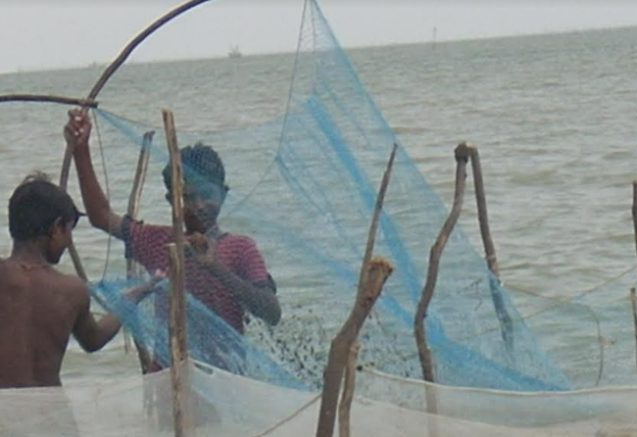 |
| Little Rann of Kutch during monsoon |
If Kalpasar, a dream project of converting the Gulf of Khambhat into Asia’s biggest sweet water lake by constructing a dam connecting South Gujarat and Saurashtra coasts, does not seem feasible any more, why not toy with the idea of yet another having a still bigger sweet water lake – this time in the Little Rann of Kutch? Suspicion has gone strong: Ahead of the 2019 polls, the BJP appears to be toying with the idea of making a 4,900 sq km Rann Sarovar an electoral plank.
While the idea has been floated by an industrialist known to be close to Prime Minister Narendra Modi, Jaysukhbhai Patel, managing director, Ajanta-Oreva group, if a recent well-attended meeting on Rann Sarovar in Gujarat Vidyapeeth is any indication, it has already been “discussed”, among others, with Modi, BJP chief Amit Shah, Gujarat chief minister Vijay Rupani, at least two ministers, and senior government officials.
 |
| Little Rann: A fishermen's heaven during monsoon |
And lo! What you would have is the 4,900 sq km Rann Sarovar, filled with nine lakh cubic metres of sweet water, “equal to that of the Narmada dam”, to quote from the book? It would not only create an “ecology effect” (sic!), with temperatures in Ahmedabad, 130-odd km away, falling by eight degrees, but become a major tourist attraction: Speed boats, scuba diving, house boats, water skating, water jet sports, hovercraft, hot air balloon, sea plane, and what not. Then, of course, tourists can here to watch flamingoes, which fly all the way from Siberia to Gujarat’s wetlands, and would now find this as their new nesting area.
 |
| Prawn, a major catch |
Discussed with Modi thrice, who reportedly told the industrialist that the idea was “worth exploring”, even as the Prime Minister “wondered” why it had not occur to anyone earlier, the book believes that the Rann Sarovar’s about 10 feet deep water, gathered from the mythical river Saraswati to Banas, Rupen, Kankavati, Brahmani, Macchu, Chandrabhaga, “in all 110 big and small rivers”, would become a major source irrigation, even as solving Saurashtra-Kutch’s drinking water problem, turning the adjoining areas into a “green belt.”
The book says, even today the Rann of Kutch is converted into a sweet water lake during the four months of monsoon, providing employment to fishermen. By stopping this water from “going waste” into the sea at Hadakiya Creek, saline water from the Gulf of Kutch wouldn’t enter in, and fisheries would become a major industry round the year.
And what would happen to an estimated 5,000 wild asses, who live the Little Rann sanctuary, their only home in the world? They could move to 75-odd islands within the Rann, which is what they do when the 4,900 sq km stretch is filled up with sweet water during the four months of monsoon. With sweet water all around, these islands, too, would become green, providing fodder.
The book says, even today the Rann of Kutch is converted into a sweet water lake during the four months of monsoon, providing employment to fishermen. By stopping this water from “going waste” into the sea at Hadakiya Creek, saline water from the Gulf of Kutch wouldn’t enter in, and fisheries would become a major industry round the year.
And what would happen to an estimated 5,000 wild asses, who live the Little Rann sanctuary, their only home in the world? They could move to 75-odd islands within the Rann, which is what they do when the 4,900 sq km stretch is filled up with sweet water during the four months of monsoon. With sweet water all around, these islands, too, would become green, providing fodder.
 |
| Jaysukhbhai Patel |
As for around thousands of salt-pan workers, who produce salt post-monsoon here, they would be free from their arduous traditional labour, finding alternative employment; even agriculture would become attractive to them.
Claiming to have the support of top technocrat Anil Kane, a founder of the idea of Kalpasar, former Gujarat chief secretary PK Laheri, and chairman and managing director of Sardar Sarovar Narmada Nigam Ltd SS Rathore, among others, the book says, on advice from the Ministry of Water Resources, Government of India, the Central Salt and Marine Chemicals Research Institute (CSMCRI) has submitted a report on Rann Sarovar, which is “broadly positive” about the proposal.

Comments
Any such project should not be left solely to the government to decide. Any project that has serious environmental implications cannot be a majority backed executive decision. What has resulted from the principle of the eminent domain of the state is there for all to see. There should be a multi-stakeholder council that relies of transparent studies, consultations and depositions of the communities who would be affected, competent environmental scientists from anywhere in the world with relevant knowledge and experience. The Council would make binding recommendations on such projects. And only on the basis on the recommendations of the independent council should the corporate groups be invited to bid for the project at the appropriate venue and permissible processes.